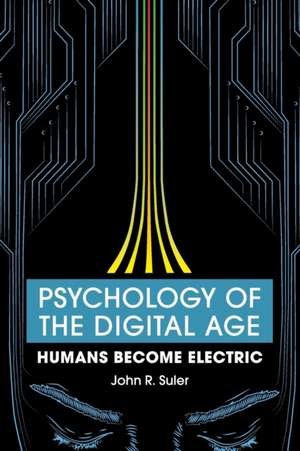Psychology of the Digital Age: Humans Become Electric: Cărțile Sidoniei Bogdan
Autor John R. Suleren Limba Engleză Paperback – 11 noi 2015
| Toate formatele și edițiile | Preț | Express |
|---|---|---|
| Paperback (1) | 326.92 lei 6-8 săpt. | |
| Cambridge University Press – 11 noi 2015 | 326.92 lei 6-8 săpt. | |
| Hardback (1) | 706.74 lei 6-8 săpt. | |
| Cambridge University Press – 17 noi 2015 | 706.74 lei 6-8 săpt. |
Din seria Cărțile Sidoniei Bogdan
- 10%
 Preț: 113.03 lei
Preț: 113.03 lei -
 Preț: 119.62 lei
Preț: 119.62 lei - 6%
 Preț: 318.32 lei
Preț: 318.32 lei -
 Preț: 79.44 lei
Preț: 79.44 lei - 14%
 Preț: 72.63 lei
Preț: 72.63 lei -
 Preț: 151.14 lei
Preț: 151.14 lei - 16%
 Preț: 69.50 lei
Preț: 69.50 lei -
 Preț: 49.00 lei
Preț: 49.00 lei - 17%
 Preț: 51.75 lei
Preț: 51.75 lei - 17%
 Preț: 78.92 lei
Preț: 78.92 lei -
 Preț: 142.35 lei
Preț: 142.35 lei - 23%
 Preț: 73.42 lei
Preț: 73.42 lei - 23%
 Preț: 53.97 lei
Preț: 53.97 lei - 15%
 Preț: 104.45 lei
Preț: 104.45 lei - 14%
 Preț: 107.16 lei
Preț: 107.16 lei - 17%
 Preț: 57.78 lei
Preț: 57.78 lei -
 Preț: 101.34 lei
Preț: 101.34 lei -
 Preț: 95.89 lei
Preț: 95.89 lei - 15%
 Preț: 92.35 lei
Preț: 92.35 lei -
 Preț: 103.41 lei
Preț: 103.41 lei -
 Preț: 266.01 lei
Preț: 266.01 lei -
 Preț: 211.71 lei
Preț: 211.71 lei - 13%
 Preț: 176.89 lei
Preț: 176.89 lei -
 Preț: 332.68 lei
Preț: 332.68 lei - 34%
 Preț: 422.93 lei
Preț: 422.93 lei - 15%
 Preț: 60.52 lei
Preț: 60.52 lei -
 Preț: 124.51 lei
Preț: 124.51 lei - 23%
 Preț: 97.78 lei
Preț: 97.78 lei - 22%
 Preț: 77.86 lei
Preț: 77.86 lei -
 Preț: 164.08 lei
Preț: 164.08 lei
Preț: 326.92 lei
Nou
62.55€ • 65.31$ • 51.77£
Carte tipărită la comandă
Livrare economică 05-19 aprilie
Specificații
ISBN-10: 110756994X
Pagini: 475
Ilustrații: 6 b/w illus.
Dimensiuni: 153 x 230 x 28 mm
Greutate: 0.64 kg
Editura: Cambridge University Press
Colecția Cambridge University Press
Seria Cărțile Sidoniei Bogdan
Locul publicării:New York, United States
Cuprins
List of figures; Foreword; Preface; Acknowledgements; Introduction: newborns in evolution; 1. Cyberpsychology architecture; 2. Presence: be here now; 3. The dynamic digital psyche; 4. The disinhibited self; 5. Electrified relationships; 6. Other than you think: interpersonal perceptions; 7. Text talk; 8. Image talk; 9. I, avatar; 10. One of us: groups and communities; 11. Change and excess; 12. Addicted or devoted; 13. The digital deviant; 14. Synthesized realities and synthesized beings; 15. Electric therapeutics; Conclusion: research and the researcher; References; Index.
Recenzii
'John Suler's long anticipated follow-up to his groundbreaking The Psychology of Cyberspace is finally here - and it's well worth the wait. Exploring what it means to be human in this digital age, Suler smartly captures the challenges facing us as we integrate and translate our analog lives - and even our relationships - into digital. This is thought-provoking reading, setting a new standard as the reference for exploring and understanding our complex, ever-evolving interactions with technology.' John M. Grohol, Founder and CEO, PsychCentral.com
'John Suler is a pioneer in the rapidly evolving field of cyberpsychology. This book integrates his groundbreaking work over the past two decades. Psychology of the Digital Age explains the diverse nature of online environments and how we form identity and communicate via text and photographs, and the intimate power of online relationships. The book looks at online communication and shows us how our online experiences help us grow, learn, and self-actualize.' Dr Kimberly S. Young, Founder and Director, Center for Internet Addiction Recovery
'… Psychology of the Digital Age is a comprehensive and subtle exploration of the various ways that online technology is disputing norms of interaction, behaviour and identity. Professor Suler has done an excellent job of setting out a clear framework for future discussion and exploration of these subjects in a way that will be beneficial and fascinating to both professionals and laypeople, and to whom it is highly recommended.' Gareth Southwell
Descriere
Based on two decades of participant-observation field research in diverse online environments, this engaging book offers insights for improving lifestyles and enhancing wellbeing in the digital age. John R. Suler, a founder of the field of cyberpsychology, explains its fundamental principles across a wide variety of topics, including online identity management, disinhibition, communication via text and photographs, intimacy and misunderstandings in online relationships, conflicting attitudes toward social media, addiction, deviant behavior, virtual reality, artificial intelligence, and media overload. He provides a new framework, the 'Eight Dimensions of Cyberpsychology Architecture', which researchers, students, and general readers interested in cyberpsychology can apply as a valuable tool for creating and understanding different digital realms. Psychology of the Digital Age focuses on the individual, shedding new light on our conscious as well as subconscious reactions to online experiences and our intrinsic human need to self-actualize.








